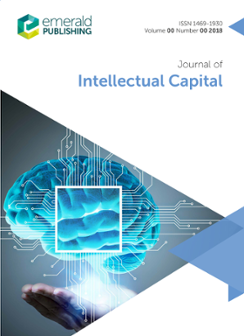The influence of human, organizational and relational capital of universities on their performance: a developing economy perspective
IF 6.8
2区 管理学
Q1 BUSINESS
引用次数: 1
Abstract
PurposeOne in every four graduates of the world will be the product of Indian higher education system by the year 2030 as per a report issued by the FICCI (Federation of Indian Chambers of Commerce and Industry) in 2015. This brings out the growing significance of higher education sector and purpose of the study. The present study tries to explore the relationship between intellectual capital of universities and their performance.Design/methodology/approachStructural equation modeling (SEM) was applied on the dataset of 590 respondents, and the suggested model reiterate that human capital, organizational capital and relational capital have a significant influence on a university's performance.FindingsHuman capital, organizational capital and relational capital have a significant influence on a university's performance. The study strongly recommends that factors like research facilitation, quality of work life, knowledge sharing, industry academia relationship and information disclosure have a strong influence on performance.Originality/valueNot just India, but policymakers across Brazil, Russia, India, China and South Africa (BRICS) can strategize around intellectual capital to give a push to the fast-growing higher education sector.人力资本、组织资本和关系资本对大学绩效的影响:发展中经济体视角
根据印度工商联合会(FICCI) 2015年发布的报告,到2030年,世界上每四个毕业生中就有一个是印度高等教育体系的产物。由此可见高等教育部门的日益重要的意义和研究的目的。本研究试图探讨高校智力资本与绩效之间的关系。设计/方法/方法对590名受访者的数据集进行了结构方程建模(SEM),所建议的模型重申了人力资本、组织资本和关系资本对大学绩效的显著影响。发现人力资本、组织资本和关系资本对大学绩效有显著影响。研究强烈建议研究便利、工作生活质量、知识共享、产学研关系和信息披露等因素对绩效有较强的影响。创意/价值不仅是印度,巴西、俄罗斯、印度、中国和南非(金砖国家)的政策制定者也可以围绕智力资本制定战略,推动快速增长的高等教育部门。
本文章由计算机程序翻译,如有差异,请以英文原文为准。
求助全文
约1分钟内获得全文
求助全文
来源期刊

Journal of Intellectual Capital
Multiple-
CiteScore
14.50
自引率
13.30%
发文量
27
期刊介绍:
The Journal of Intellectual Capital is a peer-reviewed international publication dedicated to the exchange of the latest research and best practice information on all aspects of creating, identifying, managing and measuring intellectual capital in organisations. The journal publishes original research and case studies by academic, business and public sector contributors on intellectual capital strategies, approaches, frameworks, tools, techniques and technologies in order to increase the understanding of intellectual capital within the context of the modern knowledge economy. The focus of this journal is on the identification of innovative intellectual capital strategies and the application of theoretical concepts to real-world situations.
 求助内容:
求助内容: 应助结果提醒方式:
应助结果提醒方式:


